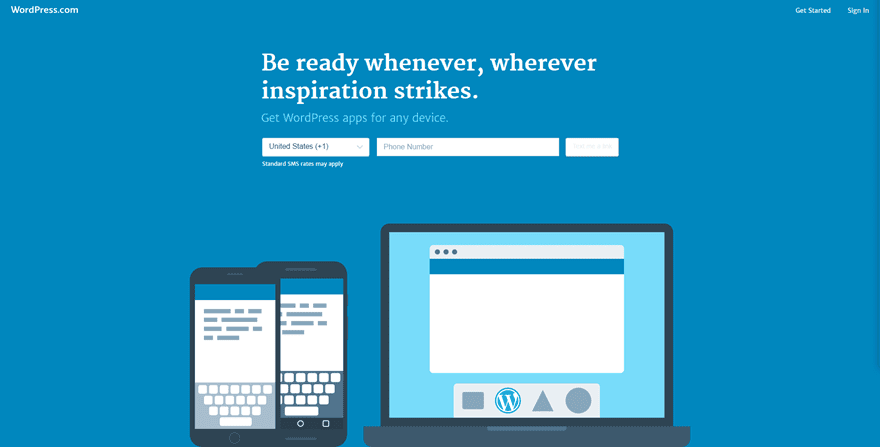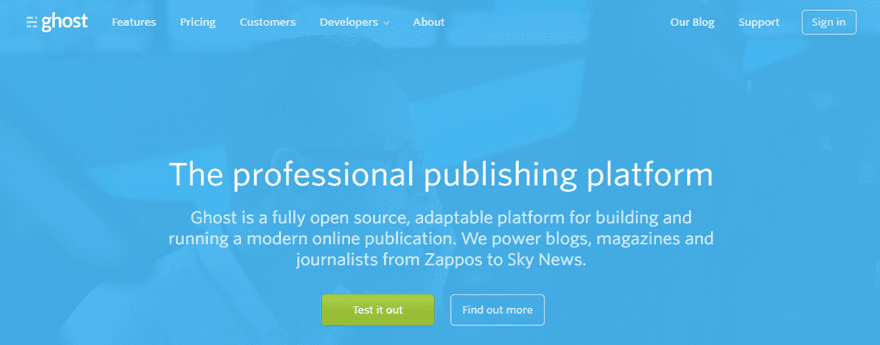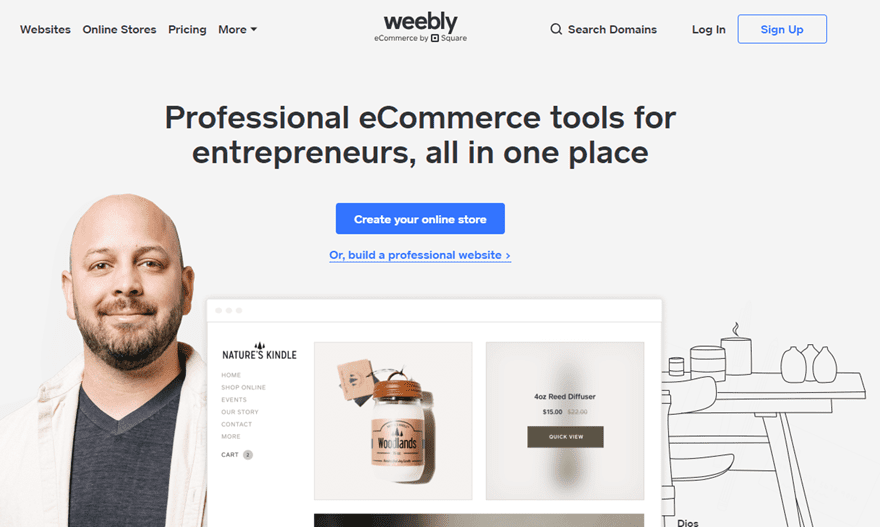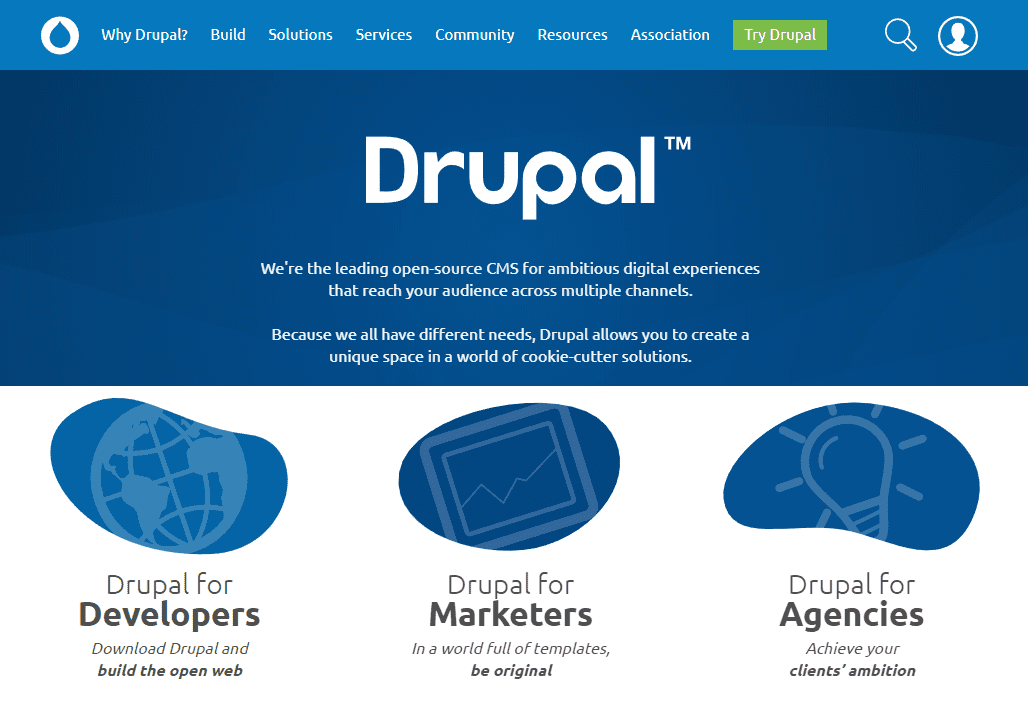Right now there are more choices than ever for anyone interested in starting a blog. Years ago you had to choose between Blogspot and WordPress. They were the only two major contenders. Today the competition is a bit stiffer. Which is why in this article we’ll be going over the current batch of top blogging platform contenders, weighing their pros and cons, and highlighting which platform is the right fit for specific types of users.
Let’s get to it!
Things to Consider
When looking for the best blogging platform, you have to realize that not all services are created equal. WordPress is a full-blown CMS, meaning that it can run an entire website as well as a blog. Ghost and Medium are dedicated to publishing content above and beyond anything else. So depending on your goals and situation, one platform may be better than another for you.
Some particular points you should run through are
- Do you have a budget for your blog? Some platforms are free, while others have an initial or monthly cost.
- Are you a designer or have access to one? Some platforms require more expertise than others.
- Do you intend to make money or run a store from the blog?
- Are you hosting the website, or do you need the blogging platform to cover that?
While there are other considerations (overall traffic and user scaling, number of contributors, and so on), these should help you narrow down your choices considerably and let you choose the best blogging platform for you. With that in mind, let’s take a look at your options.
1. WordPress.org

We are probably a little biased here, since we’re a WordPress company and all, but WordPress.org is one of the most robust and flexible blogging platforms out there. You may also see this one referred to as self-hosted WordPress because of your needing to have a web hosting plan available to get the site live. That’s different from our next entry, WordPress.com, which is hosted by Automattic, the company behind WP. Additionally, the release of WordPress 5.0 released Gutenberg, a new editing experience that significantly lowers the learning curve for WP, making it much more accessible and more focused on blogging than it has been in years.
Pros
- Huge repository of free themes and plugins
- Huge community developing premium themes and plugins
- Easy to install
- Can run any kind of website, from a blog to an ecommerce store to a membership site to anything else you can think of
- WordPress 5.0 introduced Gutenberg, a publishing-centric content editor to take on products like Wix and Squarespace
- Premium managed hosts (such as WPEngine and Flywheel) are available if you don’t want to self-host
Cons
- Basic installation isn’t that great, and you need to customize it considerably to be production-ready
- There is still a learning curve involved in getting used to it as a daily user
- Self-hosted means that you’re responsible for not only hosting but technical issues as well
WordPress.org is the best blogging platform for you if…
…you want both accessibility and almost complete freedom. You have the option to run any kind of website you want, from a simple blog to a complex mega-mart ecommerce shop. And you can go crazy and customize everything exactly as you want it, rely on pre-made designs and templates, or some mix of them both depending on your budget, time, and skills. WordPress is developer-friendly and the epitome of plug-and-play. It can be whatever you need it to be.
Price: FREE | More information
2. WordPress.com

Take everything we said about WordPress.org and scale it back just a wee bit. WordPress.com is the free, hosted alternative to WP.org. Automattic, the folks behind WordPress itself, offer free sites to anyone who signs up. You get a yoursite.wordpress.com URL, access to thousands of free plugins and themes, and the ability to start blogging in minutes (but it’s ad-supported). They handle technical issues, hosting, and much of the behind-the-scenes stuff so that you can focus on creating content and doing what you do. The free plans are limited in what you can do and add, but for a monthly fee starting at around $3 USD, you can add your own URL, install (some) premium themes and plugins, and remove the WP.com advertising.
Pros
- Easy to set up and use
- No installations
- Free, and if not free, cheap
- Behind-the-scenes tech issues are handled for you
Cons
- The free tier is ad-supported, so you have to pay to make them go away.
- Access to premium plugins and themes is restricted
WordPress.com is the best blogging platform for you if…
…you like the sound of plugins and widgets and the freedom of WordPress, but handling all the technical minutae is a little overwhelming. As long as you can deal with a few minor restrictions, WordPress.com is a great middle-ground between the freedom of WP.org and the accessibility of something like Wix or Squarespace.
Price: FREE | More information
3. Medium

When considering the best blogging platform, you can’t not look at Medium. Designed specifically for publishing, Medium is not a platform for running a full website or a store. Medium hosts the blogs on its site, and because of that, it is specifically designed to be a social blogging platform. It is free to use, slick and smooth to both read and write on, and has a built-in audience of readers and users for you to connect with. There is even a monetization strategy where you can get paid for your writing based on who reads it.
Pros
- Absolutely free to use
- Hosted so you don’t have to
- Fun to write in
- Designed for blogging first
- Opt-in monetization
- No designing experience needed (there is nothing to design!)
Cons
- There is nothing to design
- Cannot run your own monetization or ad campaigns
- Leaving the platform means leaving your audience because You don’t control the audience — Medium does
Medium is the best blogging platform for you if…
…you plan to blog and only blog. If you don’t mind leaving monetization and audience-management to the platform itself, Medium is a great fit. Content comes first and foremost, so from the moment you log into Medium, you can start writing and interacting. You get little customization, but as far as a blogging platform goes…it’s hard to find a better publishing experience.
Price: Free | More information
4. Ghost

Ghost is a very interesting platform. Like Medium, it is designed with a content-first structure, but unlike Medium, it is generally self-hosted (but there is a hosted option now). The interface for Ghost is slick and smooth, and the development team has put a lot of work into Ghost over the past few years. You can write in markdown or HTML, and even the basic designs and templates are nice looking. There can be a slight learning curve with Ghost, but that’s made up for in the speed it runs. Written in JavaScript to specifically counter WordPress’s PHP backend, Ghost shows it’s a more modern platform. However, what you gain in speed, you lose in customization — it’s not very easy to customize with plugins or apps. That said, many publications are moving to Ghost as a blogging platform because of its speed and simplicity.
Pros
- Incredibly fast to use as a writer and a reader
- A blogging-first platform
- Intuitive interface
- Can use markdown or HTML to write your posts
- Responsive on both the front and back ends
- Continuously updated by the developers and the community
- Open source
Cons
- Not every host is ready to support Ghost
- Installation on a host that does support Ghost can be complicated if you aren’t tech savvy
- As a self-hosted option, you are limited on customization options
- Very few themes available without hand-coding your own
- The community is still relatively small, but it is growing
Ghost is the best blogging platform for you if…
…you like to stay on the cutting edge of technology, engage in open source software, and tinker around with your websites a lot. Ghost probably isn’t the best blogging platform for someont to go into as their first, but if you want a totally different experience from Blogger or WordPress, Ghost is it. Really, it feels almost like a self-hosted, customizable Medium.com, and that’s not a bad thing.
Price: FREE | More information
5. Blogger (or Blogspot)

Having been around since the beginning of blogging and not going anywhere in the near future, Blogger is Google’s publishing platform. Pretty straightforward and traditional, Blogger has come up as one of the best blogging platforms for right at two decades. Since 1999, Blogger has consistently been the go-to place for writers who want to get their content out into the world. That’s partially because of it being free, partially because it’s easy and simple to use, and partially because it’s included as a part of your Google account.
Pros
- Integrated with your Google account
- Focuses on your writing and personal story
- Thousands of free layouts available, with many premium ones out there online
- Hosted by Google
- Easy for the non-technical to set up and use
- Free to add a custom URL
Cons
- Limited customization options
- No plugins
- Cannot run anything but AdSense ads
- Not set up for ecommerce or as a full CMS, so you can’t use Blogger as your company’s blog on the same URL
- Google has a history of abandoning projects they feel underperform — Reader, Wave, Goo.gl, Inbox, and so on. However unlikely, with Google it is always possible
Blogger is the best blogging platform for you if…
…you have never blogged before and have no idea how or where to start. In fact, it’s one of (if not the) most common first-stops on the way to blogging fame and fortune. Since it’s tied to your Google account, it’s easy to get started, and because the Big G keeps a pretty unified user-experience, you shouldn’t have any trouble understanding what is what in the dashboard. You can customize the layouts and pages, but not as much as WordPress or Drupal. So if you’re a total beginner, give Blogspot a shot.
Price: FREE | More information
6. Tumblr

Tumblr is an interesting blog platform. It’s a very good platform, but fairly non-traditional. Rather than generating purely original content that gets comments in a thread near the bottom, Tumblr posts get reblogged to a commentor’s blog where they add their own content. This kind of interaction is at the heart of Tumblr, and it fosters an incredibly tight-knit community. People get to know one another, and as content get reblogged, you discover new people and blogs you didn’t know about before. It has a built-in audience and traffic generation, but you get little to no control over how they can be reached. Additionally, since Tumblr was bought by Yahoo, the site has had numerous restructurings that resulted in many people abandoning the platform. However, if your blog fits within the Terms of Service, you may be able to build a solid community for your blog here. Additionally, Tumblr has a focus on visual media, so users who may be active on Instagram should feel right at home.
Pros
- Building a community is a focus of the platform
- Blogging and creating content at the forefront
- Has a unique feel when using and interacting with readers
- Built-in tools for users to contact you
- The hosted platform is stable and secure
- Image-heavy for people already used to Instagram
- Reblogging lets you focus on curation, rather than original content
- You can queue up reblogs to always keep your blog active, even if you are not
Cons
- Yahoo’s leadership has been inconsistent in how they manage Tumblr
- Non-traditional blogging and comment structure can be off-putting
- No control over your audience information (such as email lists)
- Very little customization or style choice
- No ability to monetize with ads or to run an ecommerce store or full website
Tumblr is the best blogging platform for you if…
…you aim at a slightly younger, trendier audience. Tumblr is host to a lot of fandoms and pop culture blogs, so those tend to go over quite well. Additionally, if you don’t feel like the traditional blog (post + comment threads) are necessarily the right fit, Tumblr just might be. With Tumblr’s reblogging, you don’t have to create a lot of original content to stay relevant, and you can absolutely make a name for yourself as a curator of great stuff much easier than you can on any other platform.
Price: FREE | More information
7. Squarespace

Squarespace has become a powerhouse in the web development industry. It’s easy to use, affordable, reliable, and beautiful. The platform really is one of the best blogging platforms out there, but it’s not just for writing and publishing. No, Squarespace can run ecommerce stores, host podcasts (so you don’t need a host like Libsyn). The platform’s real claim to fame is it being accessible to those who know nothing about web design. The templates on Squarespace are off-the-shelf ready, and you can only customize certain aspects of them. While that may sound limiting to some, to others it indicates that they can do it themselves without fear of anything catastrophically breaking.
Pros
- Stunning websites
- No design experience required
- No development experience required
- Previous website experience is optional
- Can run full websites or just blogs
- You get full control of audience info and retention
- Dozens of free templates to choose from
- Hosted by Squarespace, so you don’t need to have a separate host
Cons
- Monthly fee
- Tied to their platform
- Might be restrictive to people who are used to having full control over design and development
- No add-ons outside of the official Squarespace themes
Squarespace is the best blogging platform for you if…
…you prefer the hands-off approach. If you want to keep your focus on blogging or selling and not on the website itself, Squarespace will be a good fit. In a lot of ways, Squarespace is the iPhone of the blogging platform industry. It is slick, pretty, easy to use, does pretty much everything, and it has just enough customization to keep most folks happy. Some folks may feel restricted, and if that’s you, WordPress, Ghost, or Drupal are better options. For those who like to be taken care of, Squarespace is the way to go.
Price: Starting at $10 per month | More information
8. Wix

Wix is another strong contender in the hosted, drag-and-drop website space. Over the past few years, it has come a long way in its desire to overthrow the top contender: Squarespace. The editor features a drag-and-drop interface that requires no technical experience, but the UI and UX for the software is just not as smooth as other platforms. And while the initial tiers are free, they are limited in their scope. Plus they are ad supported. However, the benefit of Wix is that if you don’t mind a few ads on the front and back ends, you can get a website up in minutes that doesn’t look like it came from the mid-90s. That isn’t something many other platforms can say.
Pros
- Well designed templates
- Easy to use for beginners
Cons
- Migrating from Wix is not an easy process
- Wix’s ToS is very ambiguous on content ownership
- Ads are prevalent if you’re not paying
- The drag and drop builder can be clunky and even slow to respond on some machine
Wix is the best blogging platform for you if…
…you need a website made in a short amount of time that looks somewhat professional. Many Wix sites are temporary sites that are used for a single project or promotion and then abandoned. Wix sites are far more suited to this kind of use than Blogger or WordPress because the templates and page builder tend to be more presentable with much less customization.
Price: FREE | More information
9. Weebly

Weebly is a hosted blog platform that can function as a full website. In fact, Weebly now focuses on a built-in integration with Square (not to be confused with Squarespace) to take payments and work as an ecommerce platform to rival Shopify. If that’s part of your focus as well as blogging and content creation, Weebly might just be a good option. Plus, they have incredibly slick and well-made templates and themes, not to mention a robust plugin library. Weebly is aiming for a more professional userbase than platforms like Blogger.
Pros
- Professional themes
- Lots of plugins
- Stable ecommerce platform
- Secure payment portal
- Easy to set up and use
- Not a lot of technical experience required to get started
Cons
- The free plan is fairly limited
- Outside of the plugin library, not a lot of customization options
- Potential trouble if you leave the platform
- Other platforms aren’t always easy to link to Weebly
Weebly is the best blogging platform for you if…
…you want a blog for an ecommerce store that looks like it was professionally designed, but wasn’t. Weebly is easy to use, and you don’t need a lot of design experience to get it looking good. With the Square payments integrated, you don’t have to worry about nearly as much set up as you would with WooCommerce on WordPress, for instance.
Price: FREE but with paid plans starting at $12 | More information
10. Drupal

On the other end of the blogging platform spectrum is Drupal. While not as widely known as WordPress or Squarespace, Drupal is a popular option for folks who want a robust website with lots of options with content creation and blogging at its heart. Where WordPress has roughly 75(ish) million installations worldwide, Drupal has just over 1 million. But that isn’t for lack of quality. Drupal has an active community, many of whom are engaged in broadening the scope of the CMS and adding to its ever-growing library of modules. You do need to have a host that supports Drupal (there is not a hosted option available by default), and the set up and daily operations are a little technical. So if this is your first step into the blogosphere, you might not need to go with Drupal. However, if you know enough to feel comfortable after using, say, Blogger or WordPress.com or Squarespace, you can do worse than Drupal.
Pros
- Open source
- Lots of customization options
- Massive module library
- Lots of themes available
- Active community for support, development, and design
- Easy to use once you learn the platform
Cons
- Technical expertise helps a lot
- A learning curve, even coming from other platforms
- No hosted options, so a web host plan is necessary
Drupal is the best blogging platform for you if…
…you want a customizable CMS that is lightweight and suited for content creation. If you want to upgrade your blog into an ecommerce or membership site (or something else entirely), you can do so without swapping platforms. The technically savvy who are turned off by the restrictions placed on some blogging platforms like Squarespace and Wix will feel right at home with Drupal. This one’s great if you like to tinker. Where Squarespace is the iPhone of this industry, Drupal is definitely the stock Android.
Price: FREE | More information
What’s the Verdict?
In the end, we feel that WordPress.org is the best blogging platform out there. We are biased, sure, but in the end, when you look at all the pros and all the cons for each platform, WordPress is the ony that covers pretty much every base out there. From the technically savvy to the outright beginner, you can use WordPress. That said, every platform has its benefits, and you honestly can’t go wrong with any of these we’ve listed.
What do you think the best blogging platform is? Speak up in the comments section and tell us why!
Article featured image by PureSolution / shutterstock.com
The post How to Determine the Best Blogging Platform for You appeared first on Elegant Themes Blog.
